 Petzlover
Petzlover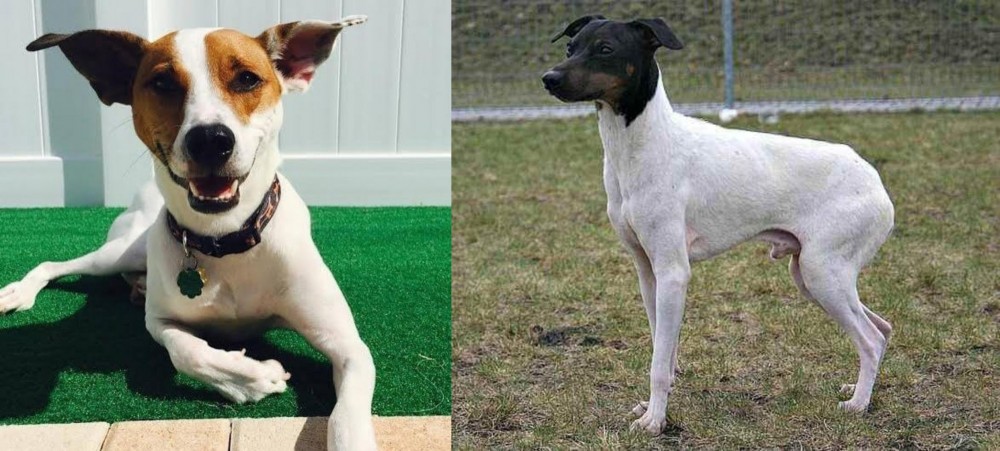 Feist is originated from United States but Japanese Terrier is originated from Japan. Feist may grow 23 cm / 10 inches higher than Japanese Terrier. Feist may weigh 10 kg / 23 pounds more than Japanese Terrier. Feist may live 3 years more than Japanese Terrier. Feist may have less litter size than Japanese Terrier. Both Feist and Japanese Terrier requires Low Maintenance.
Feist is originated from United States but Japanese Terrier is originated from Japan. Feist may grow 23 cm / 10 inches higher than Japanese Terrier. Feist may weigh 10 kg / 23 pounds more than Japanese Terrier. Feist may live 3 years more than Japanese Terrier. Feist may have less litter size than Japanese Terrier. Both Feist and Japanese Terrier requires Low Maintenance.
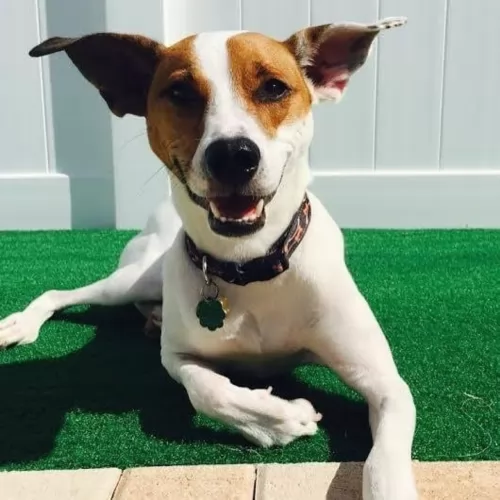 The Feist is a small dog from the United States, coming from Terrier dogs which were brought over to the States. It is believed that these Terriers included crosses between several terriers – the Manchester Terriers, Smooth Fox Terrier and English White Terrier – dogs used as ratters and known for their skills in killing rats.
The Feist is a small dog from the United States, coming from Terrier dogs which were brought over to the States. It is believed that these Terriers included crosses between several terriers – the Manchester Terriers, Smooth Fox Terrier and English White Terrier – dogs used as ratters and known for their skills in killing rats.
The Feist isn’t a new type of dog and in fact there are records of the dog which go back centuries. George Washington even referred to them in 1770 already, and the breed was popularized by President Teddy Roosevelt, who hunted with his Feist.
 The Japanese Terrier is native to Japan and is a rare pure bred dog. It is believed that the dog comes from Smooth Fox Terriers who arrived way back in the 17th century.
The Japanese Terrier is native to Japan and is a rare pure bred dog. It is believed that the dog comes from Smooth Fox Terriers who arrived way back in the 17th century.
Certainly he looks very much like a regular Fox Terrier. It is thought that these smooth Fox Terriers were then interbred with local, Japanese dogs and used to hunt rats. Gradually he became a lap dog and companion.
Planned breeding of the dog began in 1920, and it was in 1930 that the dog was admitted to the Japanese Kennel Club with a breeding program being started.
Today you will find the Japanese Terrier in his home country and small numbers elsewhere. He was admitted to the United Kennel Club in 2006.
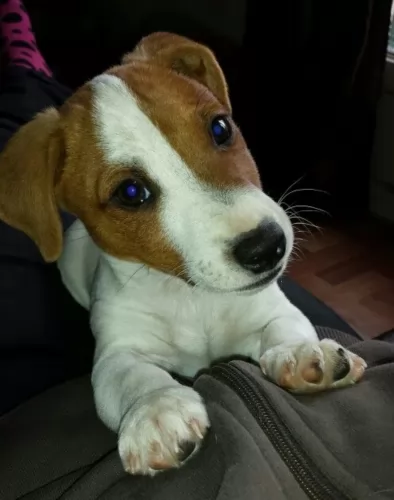 Standing at about 46cm to 56cm in height and weighing in the region of 10 to 15kg, the Feist is a short haired dog that doesn’t shed much and he is not hypoallergenic.
Standing at about 46cm to 56cm in height and weighing in the region of 10 to 15kg, the Feist is a short haired dog that doesn’t shed much and he is not hypoallergenic.
The coat of the dog is available in a variety of colors but they are essentially a bi-colored dog such as red and white, tan and white, black and white, while solid colors are fawn, white, light brown, black and brindle too.
Perhaps because of so many genes being involved with this dog, it is more easily identified because of its hunting abilities. He is a sturdy dog with a medium length tail which he holds up. Some Feist owners prefer the look of a docked tail and then docking is between the second and third joint of the tail. The Feist has erect or semi-erect ears.
Intelligent and alert, the Feist is a dog that will respond well to training. As with any other dog, training and socialization will be important for him so that he is obedient. He is energetic, curious and alert and above all he wants the attention of his human family.
 The Japanese Terrier is a small sized dog who stands at 20 – 33cm at the shoulders and weighs in at about 2 to 5kg.
The Japanese Terrier is a small sized dog who stands at 20 – 33cm at the shoulders and weighs in at about 2 to 5kg.
He is a short, smooth haired dog with a tight skin and in colors of white and black. Sometimes you may find a little bit of tan color on the face too as well as 'freckles' around the neck area and legs. The black shading of the coat is essentially found around the head of the dog and also his ears.
His ears are set high on the head and are semi-erect, semi-floppy. The tail has always been traditionally docked, giving the dog a nice compact look but these days it is unfortunately often left long and then its a medium length tail which is thinly covered in short hair. The nose is black and the eye are brown, bright and alert.
Gentle, cheerful, intelligent, loving and loyal are some of the characteristics of the Japanese Terrier. People who have kept him as a pet will vouch for him being a wonderful companion.
He is an active dog, but he still loves to be petted and won’t do well if left alone and not part of his human family. Being a clever dog, he is easy to train, learning easily and quickly. He is quite amusing at times and you can even teach him some tricks.
He gets on well with other pets in the home as well as with children. He is alert and will make a good watchdog, alerting you to an intruder.
Because of the Japanese Terrier’s small size and sensitive nature, this breed needs a calm owner and a quiet household. It is not recommended for boisterous households.
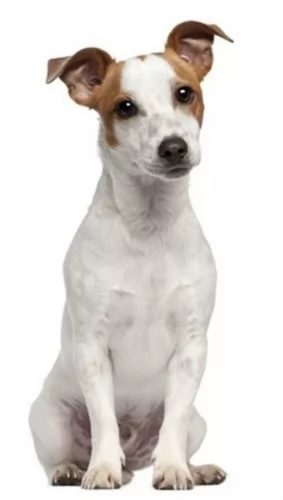 Loving to be around his human family and being a devoted and loyal canine friend, the Feist is also an intelligent, energetic dog who is fairly easy to train.
Loving to be around his human family and being a devoted and loyal canine friend, the Feist is also an intelligent, energetic dog who is fairly easy to train.
Bright and alert he makes a good watchdog too, but is amicable enough to get on well with other pets in the home as well as with children.
He can be stubborn so training and socialization will be important for him. As it is, he likes a firm, strong owner and in exchange for good care, he will become your devoted, loyal friend.
 As a pet of yours, the Japanese Terrier is an animated, contented little dog. He loves playing games and gets on well with children who aren't rough and disrespectful of him.
As a pet of yours, the Japanese Terrier is an animated, contented little dog. He loves playing games and gets on well with children who aren't rough and disrespectful of him.
He is smart and gentle and loves nothing more than to sit on your lap in the evenings and be your reading- or watching-TV companion. Give him the right amount of attention as any other family member receives and he is guaranteed to make you an excellent, low maintenance pet.
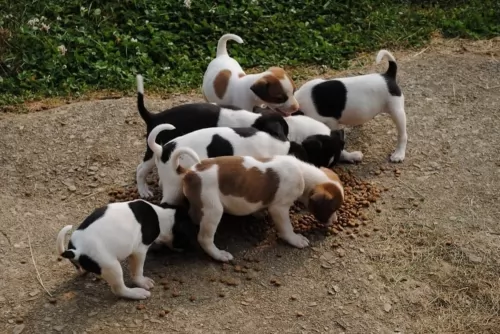 A Feist is a robust dog who doesn’t have any particular health issues, and with good care he can reach 18 years of age if looked after well. Hip Dysplasia is such a common dog illness that it always bears mentioning.
A Feist is a robust dog who doesn’t have any particular health issues, and with good care he can reach 18 years of age if looked after well. Hip Dysplasia is such a common dog illness that it always bears mentioning.
This is a ball and socket joint problem where the joint doesn’t function smoothly and the grinding of the bone leads to pain and arthritis for your pet. You'll notice he battles to play games anymore and he also battles to get up after lying down. You need to know that this disease isn’t reserved for old dogs but can start while your dog is still a puppy and that it can lead to lameness.
Look out for allergies in your dog as they can cause a host of problems which can include his skin, his breathing and problems with digestion. Typical symptoms of a dog with allergies include sneezing,scratching and very distressing for a dog, itchy and red skin which can eventually ooze.
As a responsible dog owner it is imperative when you detect problems with your dog, to get him to the vet immediately.
 The Japanese Terrier has no particular health issues and has a lifespan of 12 – 15 years if looked after well.
The Japanese Terrier has no particular health issues and has a lifespan of 12 – 15 years if looked after well.
There are always one or two illnesses to watch out for such as eye- and ear infections. Some dogs also develop conditions such as Patella Luxation. This happens when your dog's kneecap is dislocated. It can only be returned to its normal position when certain muscles in the back legs are relaxed and lengthened.
With this condition, your dog holds up one of his hind legs. This condition is more prevalent in small dog breeds.
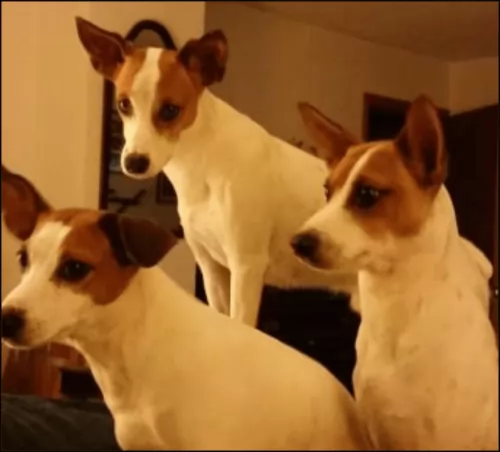 Grooming your Feist dog isn’t going to be costly or difficult at all, as with his short, smooth coat he will essentially only require a brush twice a week.
Grooming your Feist dog isn’t going to be costly or difficult at all, as with his short, smooth coat he will essentially only require a brush twice a week.
It’s good to get into the habit of brushing him as not only does it keep his coat sleek and shiny, he loves you paying him attention.
All dog owners need to know that grooming goes beyond just brushing the coat. You want to also check his nails that they are short, check in and around his ears and brush his teeth with special dog toothpaste and toothbrush.
Give your Feist the very best dog food there is. Home-made is always good but if you feed him commercially manufactured food, make sure its a quality one. Some raw meat added in every now and again is important for his health. Ensure fresh, cool water is available to him around the clock.
Your Feist is an energetic dog that has been accustomed to hunting and running down small prey. He is an outdoor dog, thriving on fun and games. Take him on your walks, your hikes or when you go cycling or swimming. He wants to be right there with you involved in everything. While he can slot into life in the city or the countryside, he isn’t an indoor dog and it certainly won’t be good for him if you keep him cooped up in a tiny garden and pretty much forget about him.
 The Japanese Terrier is an active dog and will require exercise every day. He’ll love to join you on your walks or have ball games in your garden. He can adapt to life in the city or in the country but will always need to have good exercise.
The Japanese Terrier is an active dog and will require exercise every day. He’ll love to join you on your walks or have ball games in your garden. He can adapt to life in the city or in the country but will always need to have good exercise.
The Japanese Terrier is a medium shedder and you want to be sure then to brush him twice a week to get rid of all those loose hairs.
The Japanese Terriers will require the best commercially manufactured dog food, and instead of one large meal a day, rather feed him 2 smaller meals. You can mix some tasty home-made food into his dry kibble from time to time. Excellent home-made food would be something like cooked chicken, brown rice or pasta and some vegetables.
If you can, try to also include some raw meat occasionally. If you’re in any doubt as to how to feed your Japanese Terrier so that he remains healthy, speak to your veterinarian.
Your dog should never ever be without a continuous supply of fresh, cool drinking water.